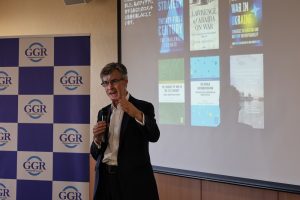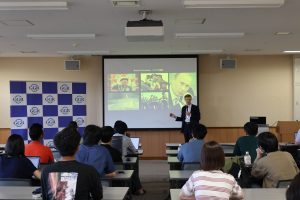On September 13, 2023, the Institute for Global Governance Research (GGR) and School of International and Public Policy (IPP) hosted a GGR Talk Session titled “Geostrategy and International Affairs: A Net Assessment,” featuring Dr. Rob Johnson, Director of the Secretary of State’s Office of Net Assessment and Challenge (SONAC) at the Ministry of Defense and former Director of the Oxford Changing Character of War Centre.
In the talk session, Dr. Johnson delved into the science of forecasting, drawing parallels to how studies in international relations anticipate future developments. He began by sharing his fascination with how past predictions, once deemed impossible – such as the rise of urbanization, wireless communications, household robots, and the proliferation of online shopping – have now become realities of our daily lives. Despite initial skepticism and the seemingly far-fetched nature of these forecasts, they have indeed materialized. In fact, with the right methods, we can enhance the accuracy of our predictions about the future. However, Dr. Johnson highlighted that our increasingly unpredictable world necessitates more advanced predictive tools. These may include innovative technologies or a new analytical approach – an interdisciplinary blend of international relations, history, and behavioral science, among others. He argues that current tools, reliant on outdated criteria, lack the sophistication required for accurate forecasting. To address this, he has introduced a concept called “net assessment.”
Dr. Johnson defines net assessments as in-depth, long-term comparative analyses that evaluate strengths and weaknesses of various actors and systems, aiming to identify strategic advantages and improve decision-making. This comes with a strategy which was defined as the deliberate deployment of resources to achieve goals through decision-making and implementation. According to him, strategy sometimes can be networks, flows, and communications, as well as the movement of resources. Furthermore, he explained that a strategic advantage is also the acquisition of a larger quantity or quality of resources, leverage, or position to carry out a plan. Dr. Johnson employed the basic concept of net assessment – such as 50 or 100 years – as a long-term comparison. He went on to define dynamic analysis, which he describes as the interaction between various entities (particularly actors and systems). He explained how net assessments offer a unique perspective on international relations because they involve a dynamic, long-term, comparative analysis of the strengths and weaknesses of different actors and systems. Highlighting that his job is to help government decision-makers make better choices based on evidence and critical reasoning, he also added that this analysis would assist them in identifying strategic advantages and making well-informed decisions. Later, Dr. Johnson addressed contemporary issues, including the Ukraine-Russia War and the rise of China. Regarding the war in Ukraine, he emphasized Russia’s need to shift from a short-term strategy to a long-term one and offered predictions about President Putin’s future actions. In the context of China’s rise, he analyzed how China’s aspirations in international relations differ from those of Russia, noting that China focuses more on long-term planning in global economic system, international institutions, and issues related to Taiwan.
During the Q&A session, questions arose about future predictions based on human factors, the modality and productivity of states after 2050, China’s intentions, the possibility of evaluating soft power by using net assessment, the usefulness of net assessment in policy making, and the crucial disadvantages of technologies such as block chain and big data analytics to maintain the international order. Last but not least, in response to a question about BRICS, Dr. Johnson concluded the event with an example involving China and the World Trade Organization. He posed the question: Why not simply improve the rules of the game within the WTO and focus more on the concept of political economics that benefits the greatest number of people? He suggested that while China may serve as a model for the Middle East and parts of Africa, substantial funds are being directed to certain African leaders who engage in questionable conduct. These leaders are using foreign direct investment from Russia and China, as well as support from mercenary groups in Russia, to maintain forms of power that are neither democratic nor fair to the majority of their populations.
【Event report prepared by】
Hnin Htet Htet Aung (Master’s student, School of International and Public Policy)
Prakrit Rakwong (Doctoral student, Graduate School of Law)


